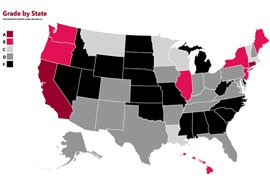Cronkite News has moved to a new home at cronkitenews.azpbs.org. Use this site to search archives from 2011 to May 2015. You can search the new site for current stories.
Arizona panned for family leave protections, along with most other states
WASHINGTON – Arizona got a grade of D for its legal protections for employees who need to take family or medical leave, in a recent national report ranking states on their health leave laws.
But the state was in good company: The report by the National Partnership for Women and Families gave grades of D or F to 34 states for their leave policies for both public- and private-sector workers.
Only California and Connecticut got an A-, the highest grade awarded in the report. Arizona’s D came for its absence of any family leave protections for parents working in the private sector, and its moderate protections for state workers.
Arizona is failing “families by lack of protections and minimum standards,” said Vicki Shabo, spokeswoman for the organization that wrote the report. She said the state is representative of a national problem and that “most states are falling flat” in protecting family leave overall.
The report, “Expecting Better,” measured factors such as paid leave, job protection and whether or not states went beyond the basic requirements of the federal law, the Family and Medical Leave Act, which guarantees many workers unpaid leave. Many states, like Arizona, have yet to pass legislation that would require private companies to provide family leave.
“The state government is setting a standard for what it thinks workers should have but perhaps it’s hesitant, as many states are, to impose on the private sector,” Shabo said.
But governments should be hesitant to impose on the private sector, said a spokesman for the Arizona Chamber of Commerce.
“Employer-employee relations should be handled party-to-party rather than dictated from Washington or some other bureaucracy,” said Garrick Taylor, the spokesman.
Taylor said the chamber “on principle … would support private businesses being able to run their businesses as they see fit, obviously within the bounds of the law.”
A bill proposed in the Arizona Legislature this year would have required that employers let workers earn paid time off for family or medical needs, and would have guaranteed that the job was there when the employee came back.
“The last thing an employee needs to worry about is getting fired because their child is sick,” said Rep. Anna Tovar, D-Tolleson, the main sponsor of the bill.
But the bill failed this year. Tovar said she plans to reintroduce the measure next year, and hopes that the state elections in November will bring in a more “moderate” crowd of lawmakers.
Currently, state government employees who need to take family or medical leave can take up to 12 weeks unpaid and have protection for their job when they come back. But Tovar said private-sector employees in the state have little or no such guarantees.
“People are cautious with taking time off,” she said. “They’re afraid they have a chance of being terminated.”
Taylor said the chamber would “guard against” a bill such as Tovar’s.
But advocates for health leave continue to push for legislation, as Shabo’s organization for two days at a conference in Washington this week.
Some private-sector employees do get health leave and protections from their companies, said Kevin Miller, spokesman for the Institute for Women’s Policy Research. But many don’t. His institute estimates that 42 percent of private-sector employees in Arizona didn’t have sick leave in 2010.
In a situation where a new parent has no vacation or sick days to use as maternity leave, “they are pretty much out of luck,” Miller said.
“A lot of women who are working and have a child … have to leave the work force,” Miller said.
The lack of support for new parents in Arizona, according to the report, is “part of the same puzzle of helping support workers who have to care of themselves and their families,” Miller said.







